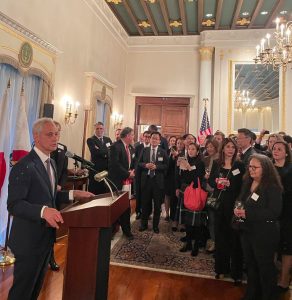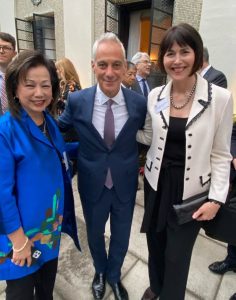Day 2 – Embassy Briefing, Climate Summit & Ambassador’s Reception
Monday in Japan was off to a busy start, although the Japanese prefer a later-morning start time, the delegates were off and running by 8:00 a.m. The delegation gathered at The Okura for a briefing from U.S. government officials, including an in-market briefing from the U.S. Commercial Service.
The delegates heard a more formal welcome from the Lt. Governor, GoBiz Director Dee Dee Myers, CDFA Secretary Karen Ross, and Visit California President Caroline Beteta — who showed the latest 30-second ad that will run at Shibuya Crossing, the largest pedestrian crossing in the world with 2 million crossing each day. Assemblymember Muratsuchi, representing Torrance, indicated his district has the largest concentration of Japanese companies in the United States. In addition, California has the largest community of Japanese descendants in the world. Further, there are more than 100 sister city relationships between California and Japan.
The U.S. Commercial Service, including a briefing from Deputy Chief of Mission Ray Greene — touched on the state of business in Japan and updates regarding the Asia Pacific Economic Cooperation (APEC), as San Francisco is set to host the APEC Leaders’ Summit this fall. There was a country briefing from the political, economic, ag, press team. All concluded that relations between the United States and Japan have never been better, and this is a most opportune time for the California delegation to visit. The embassy also indicated that this was the largest state delegation they had experienced. From the media side, Japan is the second largest market for Twitter; however, the top five newspapers are still important. Japan is working on moving away from paper to a more digital society, but that is somewhat difficult with the aging population. Digitizing the medical community, as well as new medical technologies, would be very helpful to Japan. In agriculture, with the aging society, farming is also being cut back. The average farm size in Japan is 4 acres whereas in the United States, it is approximately 400 acres. The system will be difficult to sustain in the future and now 60% of daily calorie intake is comprised of imported food. On the defense side, spending is doubling over the next five years, and Japan will become the third largest military provider in the world. Japan plays a very important role in the recent creation of the Quad.
The Quad, or Quadrilateral Security Dialogue, is a group composed of the U.S., Australia, India and Japan. The Quad began with a focus on maritime cooperation but has evolved to work on a broader agenda of security, economy and health issues in the region. All four countries are democracies with vibrant economies in the Indo-Pacific region, of which $1.9 trillion worth of U.S. trade passed through in 2019, representing 42% of the world’s exports and 38% of the world’s imports, according to the United Nations.
After the morning meeting, the delegates were off to the first official trade mission activity – the California-Japan Climate Summit at the Tokyo Hilton.
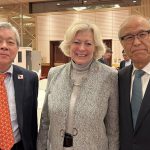
The Climate Summit’s purpose was to highlight the significant climate-related collaborations between California and Japan, and discuss California and Japan’s major government policies on decarbonization.
The Climate Summit follows the March 2022 Memorandum of Cooperation (MOC) between Governor Gavin Newsom and Japanese Ambassador to the U.S. Koji Tomita. The MOC included a framework between California and Japan to focus on the two common objectives of strengthening climate-related activities and promoting renewable, clean energy; and deepening our trade and investment relationship, including providing opportunities for business exchange and exploring investments in clean energy vehicles.

The delegation, along with local Japanese attendees, had an early lunch while listening to remarks from Lt. Governor Kounalakis, Dee Dee Myers, as well as Papia Gambelin from United Airlines. This was followed by keynote remarks by Liane Randolph, Chair of the California Air Resources Board, and Wataru Takahama, Director of Japan’s Ministry of Economy, Trade and Industry.
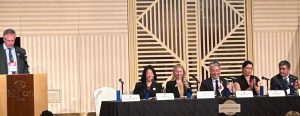
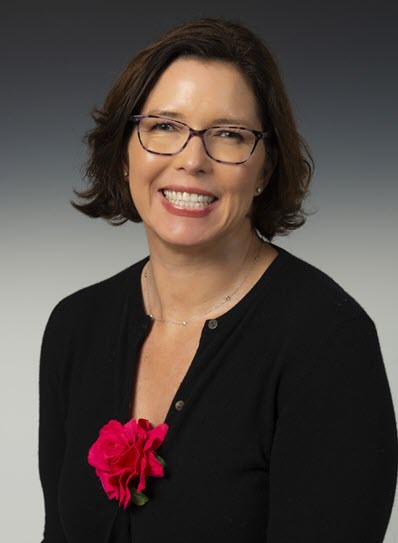
This was followed by panel discussions on opportunities in the renewable energy transformation; the role of hydrogen in the energy transition; decarbonizing ports and critical infrastructure; and climate smart agriculture and working lands. The panels featured various members of our California delegation, as well as some of their Japanese counterparts, including CalChamber Board member Kerry Hattevik, VP of Policy Development at NextEra Energy.
In addition, California Chamber member company Southern California Edison was represented by panelist Caroline Choi, senior vice president, and member Alaska Airlines was represented by Diana Rakow, senior vice president.
The Port of Los Angeles signed an MOU with longtime partner, the Port of Yokohama. We learned that in California one in five or 20% of vehicles are electric, while in Japan the figure is 34%.

After the Climate Summit, the delegation headed back to The Okura for some downtime before the evening reception at the U.S. Ambassador’s residence — following a quick group picture to commemorate the trade mission. Japan is 16 hours ahead of California.
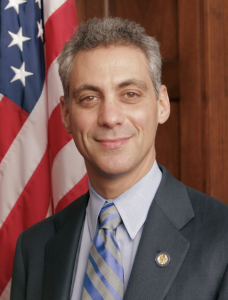
Next, the delegation gathered again and was excited to head toward the U.S. Embassy for a reception at the Ambassador’s residence. At the reception, U.S. Ambassador to Japan Rahm Emmanuel gave remarks. The ambassador discussed the historic events that had taken place in the residence, including the meeting of General MacArthur and the Japanese Emperor at the conclusion of World War II. Each of the rooms upstairs in the residence is named, but most recently President Joe Biden was in Japan and named the dining room after just-deceased California congressman and cabinet member, Norman Mineta.
Ambassador Emmanuel has been the U.S. Ambassador to Japan since December 2021, previously serving as the Mayor of Chicago.
The reception provided a great opportunity for delegates to network among key partners in Japan.

